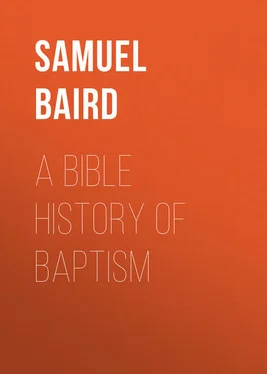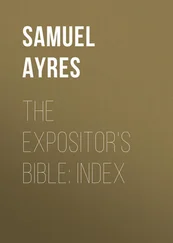Samuel Baird - A Bible History of Baptism
Здесь есть возможность читать онлайн «Samuel Baird - A Bible History of Baptism» — ознакомительный отрывок электронной книги совершенно бесплатно, а после прочтения отрывка купить полную версию. В некоторых случаях можно слушать аудио, скачать через торрент в формате fb2 и присутствует краткое содержание. Жанр: foreign_antique, foreign_prose, на английском языке. Описание произведения, (предисловие) а так же отзывы посетителей доступны на портале библиотеки ЛибКат.
- Название:A Bible History of Baptism
- Автор:
- Жанр:
- Год:неизвестен
- ISBN:нет данных
- Рейтинг книги:5 / 5. Голосов: 1
-
Избранное:Добавить в избранное
- Отзывы:
-
Ваша оценка:
- 100
- 1
- 2
- 3
- 4
- 5
A Bible History of Baptism: краткое содержание, описание и аннотация
Предлагаем к чтению аннотацию, описание, краткое содержание или предисловие (зависит от того, что написал сам автор книги «A Bible History of Baptism»). Если вы не нашли необходимую информацию о книге — напишите в комментариях, мы постараемся отыскать её.
A Bible History of Baptism — читать онлайн ознакомительный отрывок
Ниже представлен текст книги, разбитый по страницам. Система сохранения места последней прочитанной страницы, позволяет с удобством читать онлайн бесплатно книгу «A Bible History of Baptism», без необходимости каждый раз заново искать на чём Вы остановились. Поставьте закладку, и сможете в любой момент перейти на страницу, на которой закончили чтение.
Интервал:
Закладка:
The presence of God with Israel, thus impressively manifested, was not casual or transient. The fires and the terrors of Sinai were indeed withdrawn. But the tabernacle of testimony was erected, and the shechinah there revealed for the express purpose of being a testimony to Israel that God was with them dwelling in their midst. Of the services to be there established, he directed Moses that there should be “a continual burnt-offering throughout your generations, at the door of the tabernacle of the congregation before the Lord, where I will meet you to speak there unto thee. And there will I meet with the children of Israel, and the tabernacle” (or rather, as the margin, “Israel”) “shall be sanctified by my glory. And I will dwell among the children of Israel, and will be their God.” – Ex. xxix, 42-46.
Thus the gathering of Israel at Sinai was not a mere congregation or assembling of the people to each other, but a meeting with God; and this fact is very remarkably indicated in the Septuagint Greek. In the description of the Sinai scene, given in Deut. iv, in that version, the tenth verse stands thus: “The day that thou stoodest before the Lord thy God in Horeb ( tē hēmera tēs ekklēsias ), in the day of the assembly , when the Lord said to me ( Ekklēsiason pros me ), Assemble to me the people.” Previous to that occasion the word ekklēsia is not found in the Greek Scriptures. That day was, by Moses, habitually designated “the day of the ekklēsia – the assembly” (Deut. ix, 10; x, 4; xviii, 16), and the reason of the designation is thus, by the Greek translators, stamped upon the face of that version. It was so called because the people on that day met with God, in compliance with the command ( Ekklēsiason ), “ Assemble to me the people.” In accordance with the special meaning to which the word was thus appropriated it is used throughout the Scriptures. In the Old Testament and Apocrypha it occurs nearly one hundred times, and a careful examination fails to discover an instance in which it is used otherwise than to designate Israel in their sacred character as the covenant people of God. In that sense it passed into the New Testament. In one place it is exceptionally used by the town clerk of the Greek city of Ephesus, and by Luke, after him, in its classic meaning, to designate an assembly of the freemen of the city. (Acts xix, 39, 41.) But everywhere else it is employed in the same sense as in the Septuagint. It is thus applied (1) to Israel in the wilderness (Acts vii, 38), and at the temple (Heb. ii, 12); (2) to the religious assemblies of the Jews during the time of Christ’s ministry (Matt. xviii, 17), and ever afterwards, in the Acts, Epistles, and Revelation, to the New Testament Church. According, therefore, to the uniform usage of the Scriptures, the word is appropriated to designate an assembly with God, and, in a secondary sense, the people as related to such an assembly. Such is the designation given to Israel as the people of God by covenant and fellowship, among whom he held the communion of mutual converse, he with them in the words of his testimony and the communications of his grace, and they with him in all things in which they called upon him. (Deut. iv, 7. Compare Matt. xviii, 20; Acts x, 33.) In the assembly of Israel, the church of the apostles finds an origin in no wise unworthy her own lofty character and office. Happy she when with conscious experience she can take to herself the glad words of Israel’s song, “There is a river, the streams whereof shall make glad the city of God, the holy place of the tabernacles of the Most High. God is in the midst of her, she shall not be moved; God shall help her, and that right early… The Lord of hosts is with us, the God of Jacob is our refuge.” – Psalm xlvi, 4-7.
The following were the essential features of the constitution of the church thus erected:
1. Its fundamental charter was the covenant, embracing the ten commandments, in the reciprocal terms which have been considered in the preceding chapter.
2. The persons with whom these terms were made, and who were comprehended in the society thereupon erected, were all those, whether of Israel or the Gentiles, together with their households, who made credible profession of accepting the covenant, and were thereupon sealed with its baptismal seal. To this point we shall presently return.
3. The radical principle of organization was that of parental headship and family unity. The family is the divine original of all human society, as the parental office is of all human authority. Upon this basis was founded the Abrahamic covenant, and upon it was erected the system of government for Israel. It was administered by the fathers of families, of houses, and of tribes; the first-born son succeeding to his father as head of his house, under the designation of elder. This system was recognized in the first commission of Moses from God, and the elders, or heads of houses, were united with him in his mission to Pharaoh. (Ex. iii, 16, 18; iv, 29.) To them was committed the ordering of the passover on the night of the exodus. (Ib. xii, 21.) At Sinai, before the giving of the covenant, the system was perfected in its details, at the suggestion of Jethro, with the sanction of God. (Ex. xviii, 12-24.) Immediately upon the sealing of the covenant seventy of the elders, who had been previously assembled by the command of God, went up, as already stated, with Moses and Aaron, Nadab and Abihu, into the mount, and there celebrated on Israel’s behalf the feast of the covenant. “They saw the God of Israel, and did eat and drink.” – Ex. xxiv, 1, 9-11. Afterward, when the covenant was renewed in the plains of Moab, the relation of the elders thereto, in their official capacity, was expressly stated. “Ye stand this day, all of you, before the Lord your God, your captains of your tribes, your elders and your officers, with all the men of Israel, your little ones, your wives.” – Deut. xxix, 10.
Such were the essential features of the constitution of the church, as ordained at Sinai. To her, thus organized, were given ordinances of testimony, concerning which a few points only are here necessary. Since she was appointed simply to maintain, in her position in the midst of the nations, the lamp of gospel truth ever shining, until the set time should come for sending it forth through the world, the ordinances of testimony which were intrusted to her were adapted expressly to this office. They were: (1.) The oracles of God, his written word, from time to time imparted through Moses and other holy men, who spake as they were moved of the Holy Ghost. (Rom. iii, 2; 2 Pet. i, 21.) (2.) The holy convocations of the Sabbath days. (Lev. xxiii, 3; 1 Kings iv, 23; Acts xv, 21.) (3.) The priesthood and ritual service. (4.) The sanctuary worship and festivals. (5.) Public professions of faith, occasional and stated. (Deut. xxvi.) (6.) Poetic recitations and psalmody. (Ex. xv, 1-21; Deut. xxxi, xxxii; the book of Psalms.)
It was with a special view to the witnessing office of the church of Israel that the ritual system was constructed. The covenant and the ritual were testimonies to the better covenant and the heavenly realities which belong to it. It is with this view that the word “testimony” is so much used in designating them. Thus the Ten Commandments, the fundamental law of the covenant, were frequently designated “the testimony.” (Ex. xxv, 21.) The tables on which they were written were, in like manner, “the tables of the testimony.” They were kept in “the ark of the testimony,” which was in “the tabernacle of the testimony.” In the same way the whole system of ordinances and laws given to Israel is designated “the testimonies of God.” Of them, and the office of the church concerning them, the Psalmist says: “He established a testimony in Jacob, and appointed a law in Israel, which he commanded our fathers, that they should make them known to their children, that the generation to come might know them: even the children which should be born; who should arise and declare them to their children; that they might set their hope in God, and not forget his works, but keep his commandments.” – Psalm lxxviii, 5-7.
Читать дальшеИнтервал:
Закладка:
Похожие книги на «A Bible History of Baptism»
Представляем Вашему вниманию похожие книги на «A Bible History of Baptism» списком для выбора. Мы отобрали схожую по названию и смыслу литературу в надежде предоставить читателям больше вариантов отыскать новые, интересные, ещё непрочитанные произведения.
Обсуждение, отзывы о книге «A Bible History of Baptism» и просто собственные мнения читателей. Оставьте ваши комментарии, напишите, что Вы думаете о произведении, его смысле или главных героях. Укажите что конкретно понравилось, а что нет, и почему Вы так считаете.












